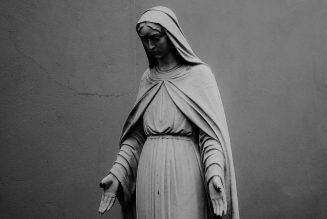
Among the first Cluny books was the French Catholic philosopher Jacques Maritain’s 1920 book “Art and Scholasticism,” which Clarke was assigned to read as an undergraduate.
“The professor would have to Xerox the book for us because he couldn’t ask us to buy it because it was only available used. You can’t ask 20 students to each drop $100 on a used copy, “ Clarke said, recalling that he read Maritain’s books as a “stapled printer paper edition” for four classes while a philosophy major at Providence.
“I finally emailed my professor after graduating, ‘We’re starting this publishing house and we’re looking to recover lost works. Do you know why ‘Art and Scholasticism’ has never been republished in a quality edition? He said, ‘I think it’s because no one knows who Maritain’s estate is, and so no one’s really touched it.’ So that became one of our first works. We identified the rights holder, licensed the book, and republished it,” Clarke said.
They acquired their second book in a similar way: Myles Connolly’s 1928 novel “Mr. Blue,” about a modern-day St. Francis who gives up a life of riches in New York City to live a life of poverty and serve the poor. The Jesuit-run publishing company Loyola Press came out with a new edition in 2005 but let its license lapse, so Cluny swept in and purchased the rights to republish it.
Sometimes it takes years to acquire the rights to a book. Such was the case with “All in the Family,” a 1966 novel about a Kennedy-esque Boston family by the Pulitzer Prize-winning author Edwin O’Connor, best known for his novel “The Last Hurrah.“
“We tried for at least three or four years investigating, trying to find who in his family or his prior literary agents actually was the decision maker. And finally, I found three people in the state of Connecticut who could possibly be it. And I called their homes. I just looked in the phone book and called and I spoke with [O’Connor’s] granddaughter. I explained who I was. She was very taken aback, actually. ‘How did you find me?’ ‘In the phone book.’”
Those who have read Sigrid Undset’s Nobel Prize-winning trilogy “Kristin Lavransdatter,” which some have called the greatest Catholic novel ever written, might be thrilled to discover that there are other books of hers to read. Her long out-of-print “The Wild Orchid” and “The Burning Bush” are available in new editions (like all Cluny books, the cover art is designed by Clarke and his mother, Kathleen Clarke). The two-volume book, first published in 1929, tells the story of Paul Selmer, a child raised according to contemporary social ideas who is drawn to the Catholic faith.
Clarke says he’s also proud to be bringing back to life the novels of Helen C. White, a longtime professor of English at the University of Wisconsin who wrote historical fiction in the 1930s. Cluny published her novel “A Watch in the Night,” about a Franscian friar in the 13th century, and plans to publish more of her books in the future.
“She was runner-up for the Pulitzer for it and almost won the National Book Award. It’s a phenomenal book, and it only ever had one printing despite the fact that it almost won those awards. And same with all her books she’s published by McMillan. So it’s a big publishing contract, and her legacy has pretty much disappeared.”
“I can’t even remember where I first found her name, but that was really amazing to find these historical novels. I haven’t found anything else really like them,” he said.
Among Cluny’s current bestsellers, which are available online and at some independent and university bookstores, is “A Sign of Contradiction,” a book of meditations taken from a Lenten retreat given by Cardinal Karol Wojtyla before he became Pope John Paul II.
(Story continues below)
Also popular: Rumer Godden’s 1969 novel “In the House of Brede”; the English Catholic priest and theologian Ronald Knox’s “The Mass in Slow Motion”; and French Catholic historian Henri Daniel-Rops’ 10-volume history of the Catholic Church, which became something of a surprise hit, Clarke said.
A cradle Catholic from a family of eight children, Clarke attributes his taste for old books to his upbringing. His mother used the “great books” program as part of her home schooling curriculum. Clarke read the comic novels of the British author P.G. Wodehouse for fun and was “shocked” when he went to college and nobody was familiar with his favorite “comfort reading.”
“I had the ‘Jeeves and Wooster Omnibus’ on my desk and no one knew what the heck it was. ‘Why do you have this kind of Downton Abbey-looking book on your desk?’ But I just felt like everybody read Wodehouse.’ The author is one of the several non-Catholic writers whose books Cluny has republished.
Clarke laments that as a society we have lost touch with the past and attributes it in part to a neglect of its literature.
“If you only read the new stuff without that foundation, I think you just get lost. But I think we see that in our discourse, whether that’s within the Church or within our political order. There’s a lot of talk and a lot of ideas and a lot of remonstration. But no common foundation because we don’t know our past,” said Clarke, whose own writing can be found on his Substack, “Lord of Indiscipline.”
“If someone asked me for a book, I would give them an old book because you got to start somewhere… A lot of the things we look at about our culture that we grieve about — we’re very isolated, we’re very transient, we’re very untethered from any kind of moral groundings. We can say that you can locate it and find an analog for it in literature.








